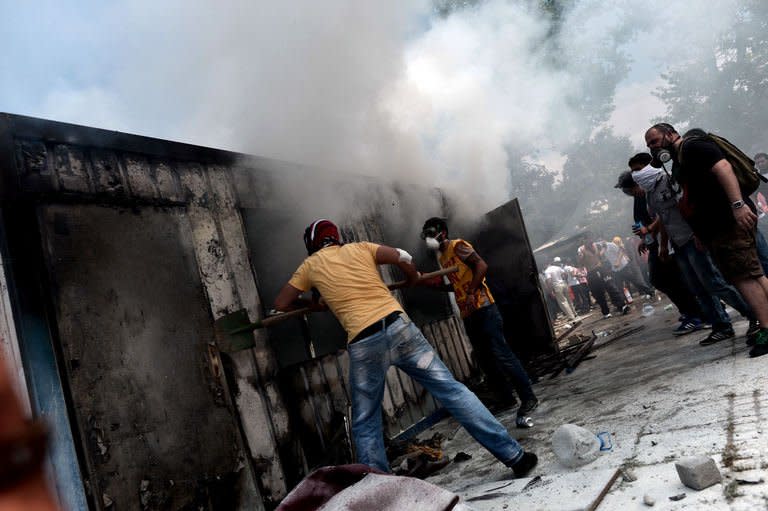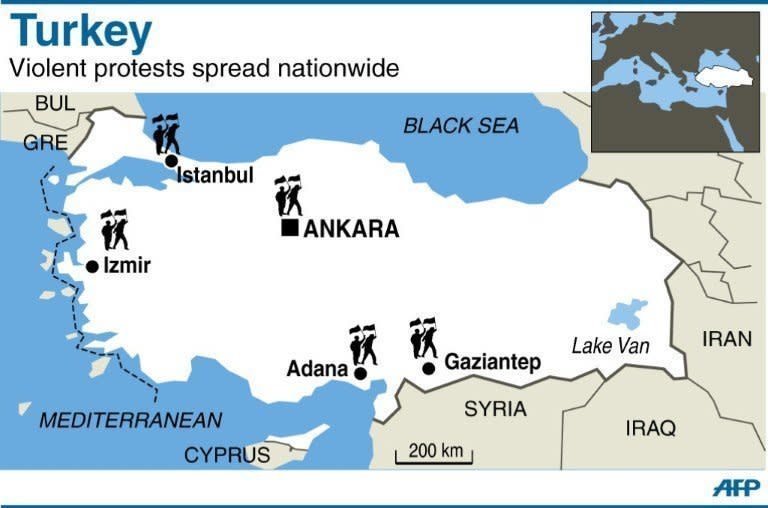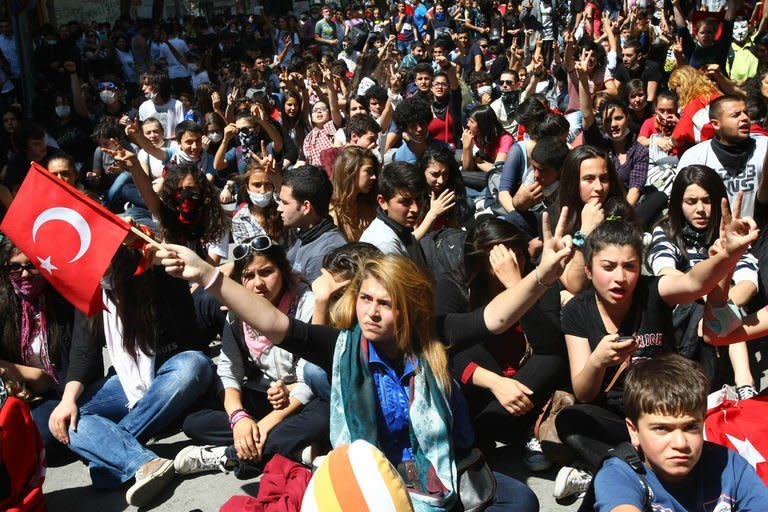Turkey apologises to injured to disarm protests
Turkey's Islamic-rooted government apologised on Tuesday to wounded protestors and said it had "learnt its lesson" after days of mass street demonstrations that have posed the biggest challenge to Prime Minister Recep Tayyip Erdogan's decade in office. The United Nations joined Washington in pressing for a full investigation into allegations of police violence against anti-government demonstrators, while Turkey's main union federation launched a two-day strike over what it branded "state terror". Erdogan's embattled government sought to ease tensions, admitting that actions by security forces against people with "rightful demands" had driven the situation out of hand. "I apologise to those who were subject to violence because of their sensitivity for the environment," Deputy Prime Minister Bulent Arinc said at a press conference, referring to the first protestors injured when clashes erupted on Friday. "The government has learnt its lesson from what happened," he added. "We do not have the right and cannot afford to ignore people. Democracies cannot exist without opposition." Arinc said clashes had left about 300 people wounded in five days although rights groups and doctors have put the number of injured in the thousands and two people have been killed. He called on "responsible citizens" to stop the protests, but hundreds of demonstrators defied his message and returned peacefully within hours to Taksim Square, the cradle of the protests in Istanbul. They repeated their charges that Erdogan was imposing conservative Islamic reforms on the predominantly Muslim but constitutionally secular nation. "If they step back, if they change something in Turkey, the conservatism and the things they've done, then maybe the crowd can go home," said Didem Kul, a 24-year-old student on Taksim square. "But we can't go home without having a demonstration. And even if we go home, the feelings won't change." Overnight, riot police in the cities of Istanbul, Ankara and Izmir fired tear gas and water cannons at protesters who set cars ablaze, hurled stones and bellowed angry slogans against Erdogan and his Islamic-leaning policies, chanting "Tayyip, Resign!" Erdogan has remained defiant, lashing out at "extremists" for the clashes and dismissing critics who branded him a "dictator" as he pressed ahead with a tour of north Africa despite the trouble at home. The Istanbul stock market tumbled to close 10 percent lower on Monday and recovered by nearly five percent on Tuesday after Arinc's comments. The violence first erupted after police cracked down on a peaceful rally in Istanbul against plans to build over Gezi Park, a rare green spot adjoining Taksim Square. It quickly swelled into broader protests in dozens of other cities. One protester was killed in the southern city of Antakya on Monday, local officials said, and doctors said a young man was killed in Istanbul on Sunday when a car ploughed into a crowd of demonstrators. The UN joined Turkey's key strategic ally the United States and other Western partners in voicing concern about reports of excessive force by police and called for a full investigation into alleged rights abuses. "The perpetrators should be brought to justice," said Cecile Pouilly, spokeswoman for the UN high commission for human rights. The Turkish Confederation of Public Workers' Unions (KESK) which represents 240,000 employees, launched a two-day strike across Turkey, a country of 75 million people sitting at the crossroads of east and west. "We hear of schools closing down because teachers joined the strike but it is too soon and hard to speak right now" about its overall impact, KESK spokesman Baki Cinar told AFP on Tuesday. Another bigger union grouping, CISK which has 420,000 members, said it too would join the strike and demonstrations on Wednesday. Cinar rejected Arinc's conciliatory move. "The apology is just damage control and only because they know they are stuck," Cinar said. "There are things they need to do before we find the apology meaningful," he added, calling for the park project to be abandoned for a start. Erdogan, whose Justice and Development Party (AKP) first took power in 2002, has accused "vandals" and opponents including the main opposition Republican People's Party of having a hand in the protests. Opponents have accused him of repressing critics, including journalists, Kurds and the military, and pushing conservative Islamic policies including religious education reforms and a law curbing the sale of alcohol. Erdogan, who has won three successive national elections, told protesters they should wait to express their views in polls next year, when observers expect him to make a run for president. "For me, democracy comes from the ballot box." Italy said Tuesday that it considered the violence had not undermined Turkey's chances of joining the European Union. "Italy continues to firmly believe in Turkey's European prospects and its essential role in terms of stability and security in the region," Foreign Minister Emma Bonino said in a statement.




